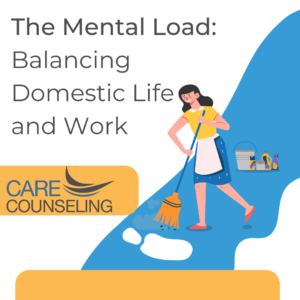 In today’s fast-paced world, the demands of both domestic life and work can create an overwhelming mental load for individuals. The mental load refers to the invisible burden of managing and organizing various tasks, responsibilities, and decisions. This burden often falls disproportionately on women, impacting their overall well-being and work-life balance. In this blog post, we delve into the concept of the mental load, explore its impact on individuals, and discuss strategies for achieving a healthier balance between domestic life and work.
In today’s fast-paced world, the demands of both domestic life and work can create an overwhelming mental load for individuals. The mental load refers to the invisible burden of managing and organizing various tasks, responsibilities, and decisions. This burden often falls disproportionately on women, impacting their overall well-being and work-life balance. In this blog post, we delve into the concept of the mental load, explore its impact on individuals, and discuss strategies for achieving a healthier balance between domestic life and work.
Understanding the Mental Load
The mental load encompasses all the mental efforts involved in managing and coordinating household chores, childcare, financial planning, and emotional labor. It involves remembering, planning, and executing tasks, as well as anticipating and fulfilling the needs of others. While both men and women can experience the mental load, studies have consistently shown that women tend to bear a larger share of this burden.
The Impact of the Mental Load
The mental load can have significant consequences for individuals’ well-being, relationships, and career progression. Juggling multiple responsibilities can lead to stress, burnout, and a constant feeling of being overwhelmed. Moreover, the mental load can hinder professional growth as individuals may find it challenging to focus and excel in their careers while simultaneously managing domestic responsibilities.
Strategies for Managing the Mental Load
- Open Communication: Start by having open conversations with your partner or family members about the mental load and the need for shared responsibilities. Clearly express your needs and concerns, and work together to find practical solutions that distribute the load more equitably.
- Delegation and Outsourcing: Learn to delegate tasks and share the responsibilities. Break down household chores and childcare duties into manageable portions, and involve everyone in the family. Additionally, consider outsourcing certain tasks, such as hiring a cleaning service or using meal delivery services, to reduce the mental burden.
- Prioritize and Simplify: Focus on the most essential tasks and set realistic expectations. Avoid perfectionism and embrace the idea that not everything needs to be done perfectly. Simplify routines and create systems to streamline household management, such as meal planning or shared calendars.
- Self-Care and Boundaries: Prioritize self-care and establish boundaries to prevent burnout. Take breaks, engage in activities that recharge you, and learn to say no when necessary. Communicate your boundaries to others and make time for yourself without guilt.
- Support Networks: Seek support from friends, family, or online communities that understand the challenges of balancing domestic life and work. Sharing experiences and strategies with others can provide valuable insights and emotional support.
The mental load associated with managing domestic life and work can be overwhelming, but it is crucial to address and redistribute this burden for a healthier work-life balance. By fostering open communication, delegating tasks, simplifying routines, practicing self-care, and seeking support, individuals can alleviate the mental load and create a more sustainable and fulfilling lifestyle. Remember, achieving balance is an ongoing process that requires continuous effort and collaboration to ensure the well-being of everyone involved.
We’re Here to help
Our wellness experts will be happy to take care of you. You can CLICK HERE to schedule an appointment now or call (612)223-8898.
Meet Clinicians
We’re united by our commitment to providing effective, relevant, and innovative mental health support at all stages of your journey. Click Here to find a therapist or find out more about who we are, where we come from, and how we live out CARE’s mission every day.
The professionals at CARE are actively collecting and creating resources to help with what you need and address frequently asked questions. We’re Here for You.



